Psychosocial Management of Diabetes: A Literature Review
VerifiedAdded on 2022/08/22
|23
|6791
|14
Essay
AI Summary
This essay comprehensively examines the psychosocial management of diabetes, a prevalent global health concern. It explores the disease framework, drawing upon ten peer-reviewed journals to analyze effective strategies for individual and community-level interventions. The essay addresses the impact of diabetes on patients' emotional well-being and quality of life, emphasizing the need for comprehensive behavioral and psychiatric approaches. It reviews the methodology used, including search strategies and article selection criteria. The findings highlight the increasing prevalence of diabetes, its psychosocial impacts such as depression and anxiety, and the varying management protocols across different age groups and countries. The essay evaluates the mixed methods appraisal tools used to assess the quality of the studies. It emphasizes the importance of early diagnosis, patient education, and the integration of mental and physical health care. The essay concludes with recommendations for improving psychosocial management in Australia, promoting better patient outcomes, and addressing the socioeconomic burden associated with diabetes.
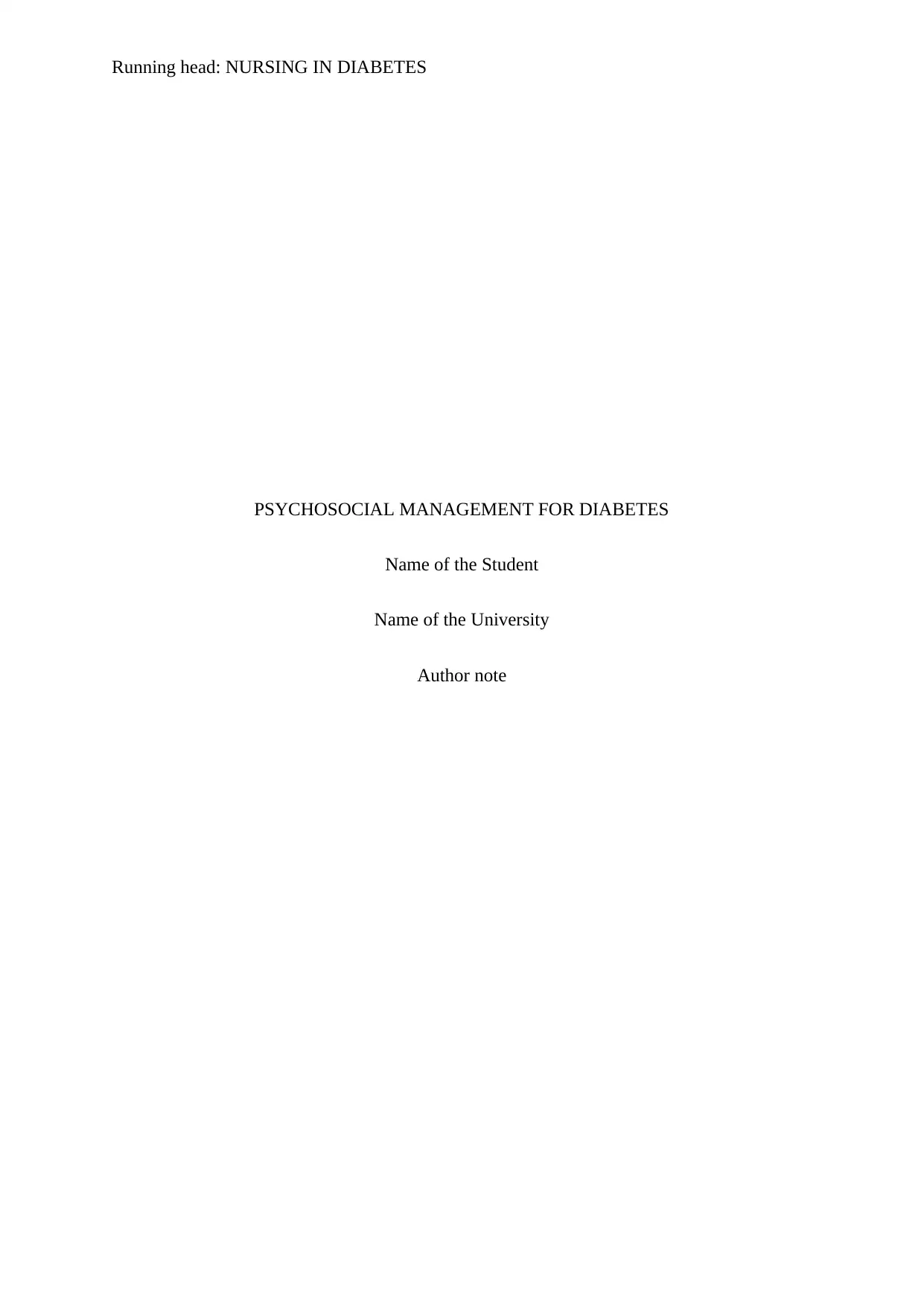
Running head: NURSING IN DIABETES
PSYCHOSOCIAL MANAGEMENT FOR DIABETES
Name of the Student
Name of the University
Author note
PSYCHOSOCIAL MANAGEMENT FOR DIABETES
Name of the Student
Name of the University
Author note
Paraphrase This Document
Need a fresh take? Get an instant paraphrase of this document with our AI Paraphraser
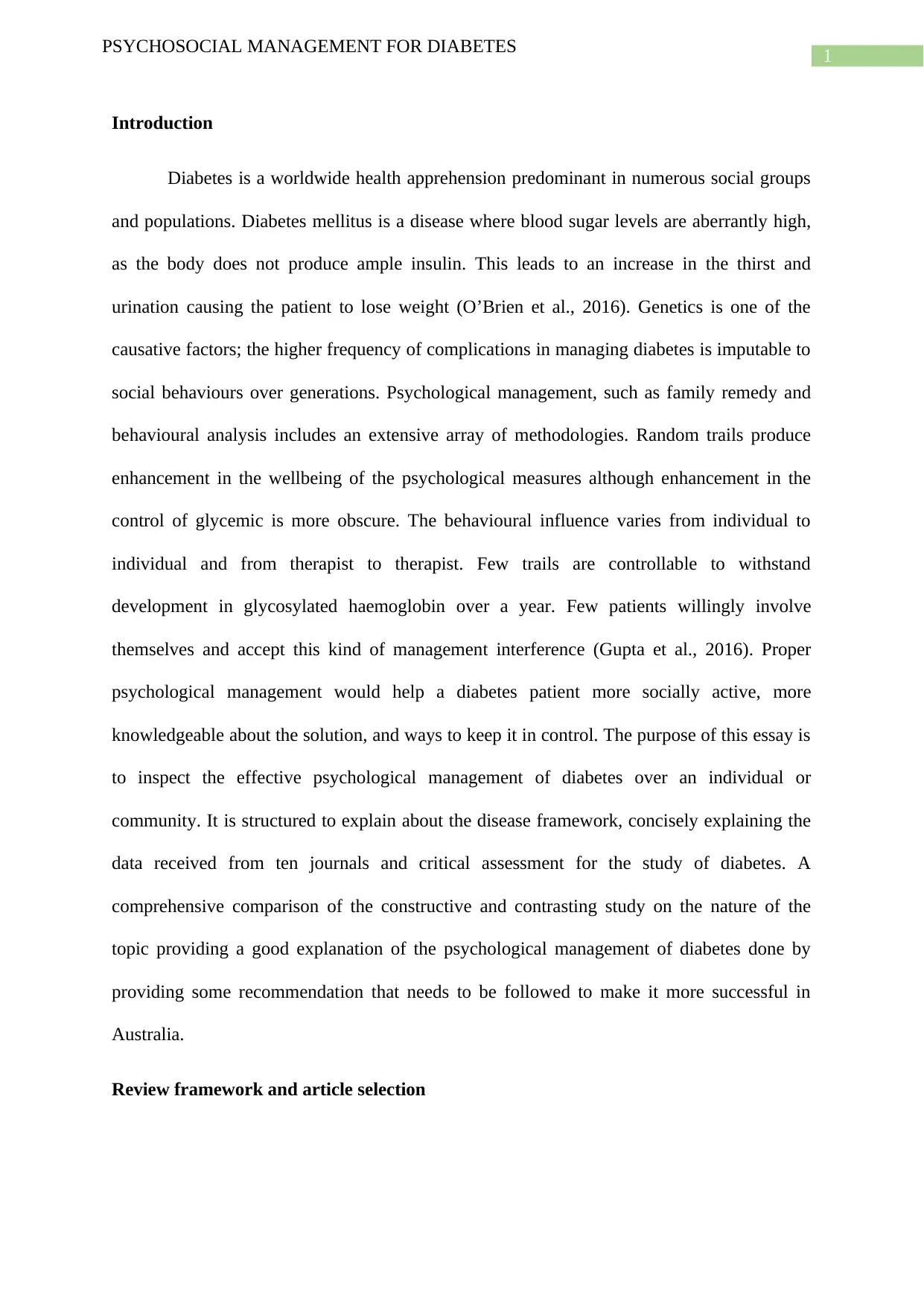
1
PSYCHOSOCIAL MANAGEMENT FOR DIABETES
Introduction
Diabetes is a worldwide health apprehension predominant in numerous social groups
and populations. Diabetes mellitus is a disease where blood sugar levels are aberrantly high,
as the body does not produce ample insulin. This leads to an increase in the thirst and
urination causing the patient to lose weight (O’Brien et al., 2016). Genetics is one of the
causative factors; the higher frequency of complications in managing diabetes is imputable to
social behaviours over generations. Psychological management, such as family remedy and
behavioural analysis includes an extensive array of methodologies. Random trails produce
enhancement in the wellbeing of the psychological measures although enhancement in the
control of glycemic is more obscure. The behavioural influence varies from individual to
individual and from therapist to therapist. Few trails are controllable to withstand
development in glycosylated haemoglobin over a year. Few patients willingly involve
themselves and accept this kind of management interference (Gupta et al., 2016). Proper
psychological management would help a diabetes patient more socially active, more
knowledgeable about the solution, and ways to keep it in control. The purpose of this essay is
to inspect the effective psychological management of diabetes over an individual or
community. It is structured to explain about the disease framework, concisely explaining the
data received from ten journals and critical assessment for the study of diabetes. A
comprehensive comparison of the constructive and contrasting study on the nature of the
topic providing a good explanation of the psychological management of diabetes done by
providing some recommendation that needs to be followed to make it more successful in
Australia.
Review framework and article selection
PSYCHOSOCIAL MANAGEMENT FOR DIABETES
Introduction
Diabetes is a worldwide health apprehension predominant in numerous social groups
and populations. Diabetes mellitus is a disease where blood sugar levels are aberrantly high,
as the body does not produce ample insulin. This leads to an increase in the thirst and
urination causing the patient to lose weight (O’Brien et al., 2016). Genetics is one of the
causative factors; the higher frequency of complications in managing diabetes is imputable to
social behaviours over generations. Psychological management, such as family remedy and
behavioural analysis includes an extensive array of methodologies. Random trails produce
enhancement in the wellbeing of the psychological measures although enhancement in the
control of glycemic is more obscure. The behavioural influence varies from individual to
individual and from therapist to therapist. Few trails are controllable to withstand
development in glycosylated haemoglobin over a year. Few patients willingly involve
themselves and accept this kind of management interference (Gupta et al., 2016). Proper
psychological management would help a diabetes patient more socially active, more
knowledgeable about the solution, and ways to keep it in control. The purpose of this essay is
to inspect the effective psychological management of diabetes over an individual or
community. It is structured to explain about the disease framework, concisely explaining the
data received from ten journals and critical assessment for the study of diabetes. A
comprehensive comparison of the constructive and contrasting study on the nature of the
topic providing a good explanation of the psychological management of diabetes done by
providing some recommendation that needs to be followed to make it more successful in
Australia.
Review framework and article selection
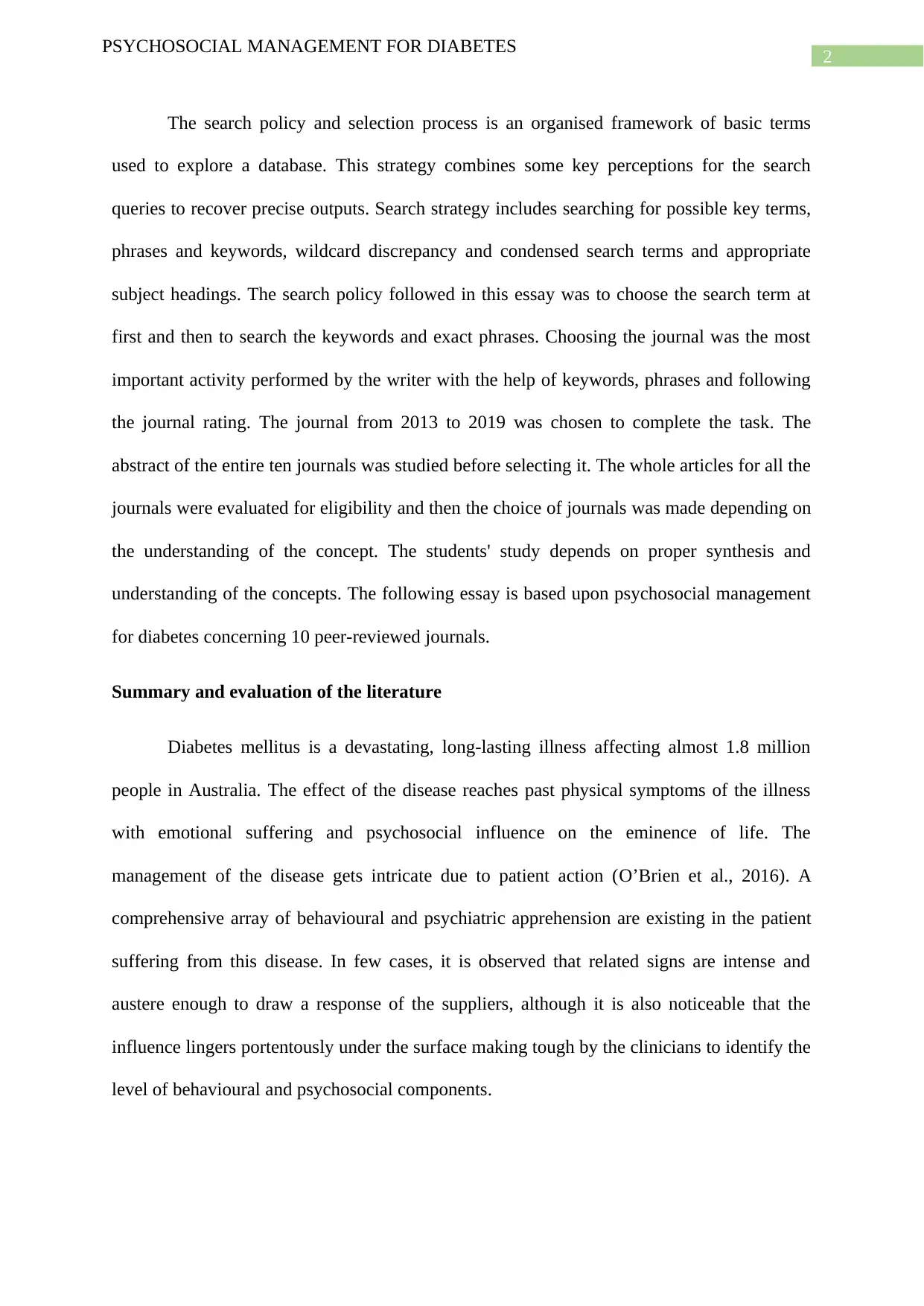
2
PSYCHOSOCIAL MANAGEMENT FOR DIABETES
The search policy and selection process is an organised framework of basic terms
used to explore a database. This strategy combines some key perceptions for the search
queries to recover precise outputs. Search strategy includes searching for possible key terms,
phrases and keywords, wildcard discrepancy and condensed search terms and appropriate
subject headings. The search policy followed in this essay was to choose the search term at
first and then to search the keywords and exact phrases. Choosing the journal was the most
important activity performed by the writer with the help of keywords, phrases and following
the journal rating. The journal from 2013 to 2019 was chosen to complete the task. The
abstract of the entire ten journals was studied before selecting it. The whole articles for all the
journals were evaluated for eligibility and then the choice of journals was made depending on
the understanding of the concept. The students' study depends on proper synthesis and
understanding of the concepts. The following essay is based upon psychosocial management
for diabetes concerning 10 peer-reviewed journals.
Summary and evaluation of the literature
Diabetes mellitus is a devastating, long-lasting illness affecting almost 1.8 million
people in Australia. The effect of the disease reaches past physical symptoms of the illness
with emotional suffering and psychosocial influence on the eminence of life. The
management of the disease gets intricate due to patient action (O’Brien et al., 2016). A
comprehensive array of behavioural and psychiatric apprehension are existing in the patient
suffering from this disease. In few cases, it is observed that related signs are intense and
austere enough to draw a response of the suppliers, although it is also noticeable that the
influence lingers portentously under the surface making tough by the clinicians to identify the
level of behavioural and psychosocial components.
PSYCHOSOCIAL MANAGEMENT FOR DIABETES
The search policy and selection process is an organised framework of basic terms
used to explore a database. This strategy combines some key perceptions for the search
queries to recover precise outputs. Search strategy includes searching for possible key terms,
phrases and keywords, wildcard discrepancy and condensed search terms and appropriate
subject headings. The search policy followed in this essay was to choose the search term at
first and then to search the keywords and exact phrases. Choosing the journal was the most
important activity performed by the writer with the help of keywords, phrases and following
the journal rating. The journal from 2013 to 2019 was chosen to complete the task. The
abstract of the entire ten journals was studied before selecting it. The whole articles for all the
journals were evaluated for eligibility and then the choice of journals was made depending on
the understanding of the concept. The students' study depends on proper synthesis and
understanding of the concepts. The following essay is based upon psychosocial management
for diabetes concerning 10 peer-reviewed journals.
Summary and evaluation of the literature
Diabetes mellitus is a devastating, long-lasting illness affecting almost 1.8 million
people in Australia. The effect of the disease reaches past physical symptoms of the illness
with emotional suffering and psychosocial influence on the eminence of life. The
management of the disease gets intricate due to patient action (O’Brien et al., 2016). A
comprehensive array of behavioural and psychiatric apprehension are existing in the patient
suffering from this disease. In few cases, it is observed that related signs are intense and
austere enough to draw a response of the suppliers, although it is also noticeable that the
influence lingers portentously under the surface making tough by the clinicians to identify the
level of behavioural and psychosocial components.
⊘ This is a preview!⊘
Do you want full access?
Subscribe today to unlock all pages.

Trusted by 1+ million students worldwide
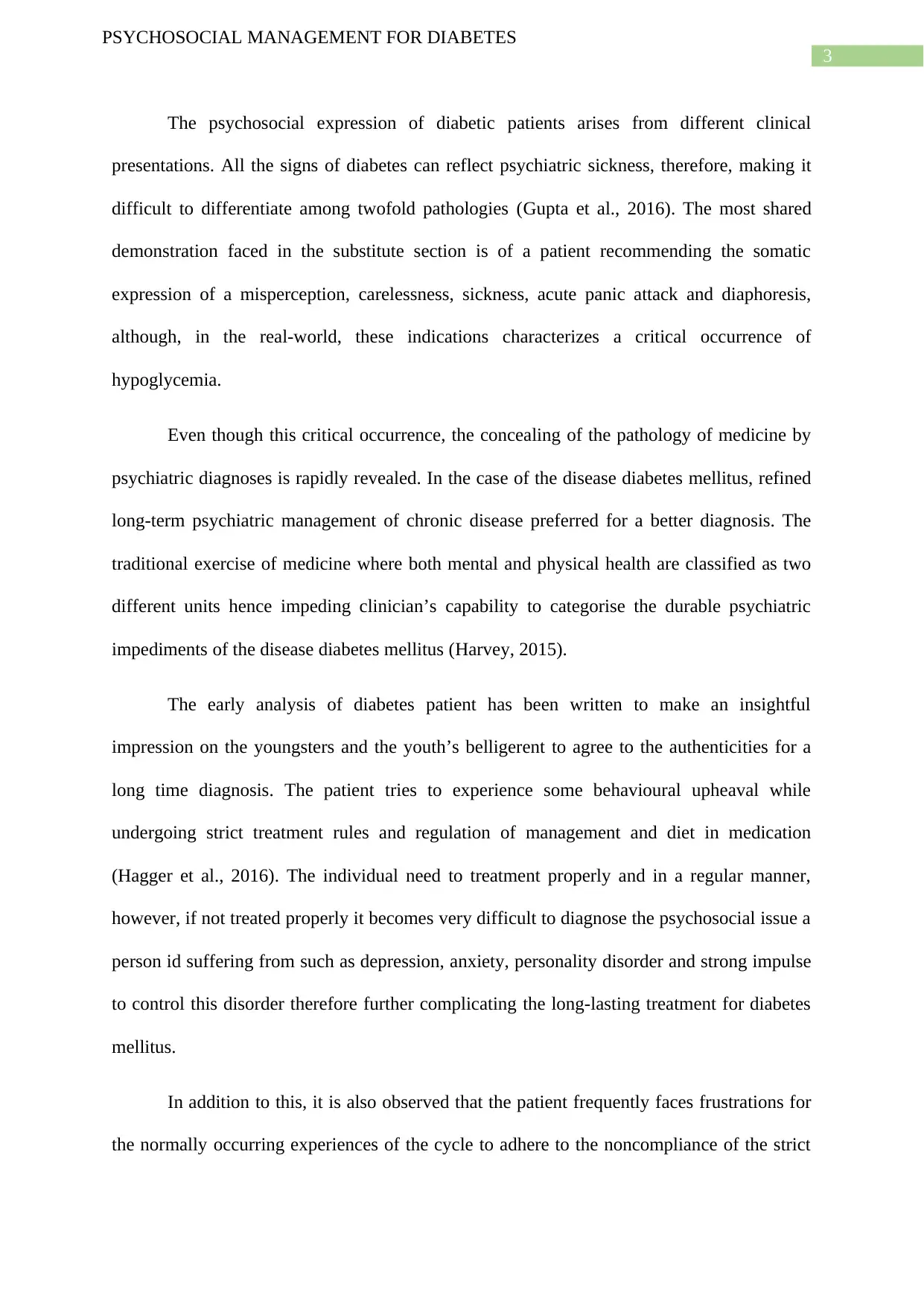
3
PSYCHOSOCIAL MANAGEMENT FOR DIABETES
The psychosocial expression of diabetic patients arises from different clinical
presentations. All the signs of diabetes can reflect psychiatric sickness, therefore, making it
difficult to differentiate among twofold pathologies (Gupta et al., 2016). The most shared
demonstration faced in the substitute section is of a patient recommending the somatic
expression of a misperception, carelessness, sickness, acute panic attack and diaphoresis,
although, in the real-world, these indications characterizes a critical occurrence of
hypoglycemia.
Even though this critical occurrence, the concealing of the pathology of medicine by
psychiatric diagnoses is rapidly revealed. In the case of the disease diabetes mellitus, refined
long-term psychiatric management of chronic disease preferred for a better diagnosis. The
traditional exercise of medicine where both mental and physical health are classified as two
different units hence impeding clinician’s capability to categorise the durable psychiatric
impediments of the disease diabetes mellitus (Harvey, 2015).
The early analysis of diabetes patient has been written to make an insightful
impression on the youngsters and the youth’s belligerent to agree to the authenticities for a
long time diagnosis. The patient tries to experience some behavioural upheaval while
undergoing strict treatment rules and regulation of management and diet in medication
(Hagger et al., 2016). The individual need to treatment properly and in a regular manner,
however, if not treated properly it becomes very difficult to diagnose the psychosocial issue a
person id suffering from such as depression, anxiety, personality disorder and strong impulse
to control this disorder therefore further complicating the long-lasting treatment for diabetes
mellitus.
In addition to this, it is also observed that the patient frequently faces frustrations for
the normally occurring experiences of the cycle to adhere to the noncompliance of the strict
PSYCHOSOCIAL MANAGEMENT FOR DIABETES
The psychosocial expression of diabetic patients arises from different clinical
presentations. All the signs of diabetes can reflect psychiatric sickness, therefore, making it
difficult to differentiate among twofold pathologies (Gupta et al., 2016). The most shared
demonstration faced in the substitute section is of a patient recommending the somatic
expression of a misperception, carelessness, sickness, acute panic attack and diaphoresis,
although, in the real-world, these indications characterizes a critical occurrence of
hypoglycemia.
Even though this critical occurrence, the concealing of the pathology of medicine by
psychiatric diagnoses is rapidly revealed. In the case of the disease diabetes mellitus, refined
long-term psychiatric management of chronic disease preferred for a better diagnosis. The
traditional exercise of medicine where both mental and physical health are classified as two
different units hence impeding clinician’s capability to categorise the durable psychiatric
impediments of the disease diabetes mellitus (Harvey, 2015).
The early analysis of diabetes patient has been written to make an insightful
impression on the youngsters and the youth’s belligerent to agree to the authenticities for a
long time diagnosis. The patient tries to experience some behavioural upheaval while
undergoing strict treatment rules and regulation of management and diet in medication
(Hagger et al., 2016). The individual need to treatment properly and in a regular manner,
however, if not treated properly it becomes very difficult to diagnose the psychosocial issue a
person id suffering from such as depression, anxiety, personality disorder and strong impulse
to control this disorder therefore further complicating the long-lasting treatment for diabetes
mellitus.
In addition to this, it is also observed that the patient frequently faces frustrations for
the normally occurring experiences of the cycle to adhere to the noncompliance of the strict
Paraphrase This Document
Need a fresh take? Get an instant paraphrase of this document with our AI Paraphraser
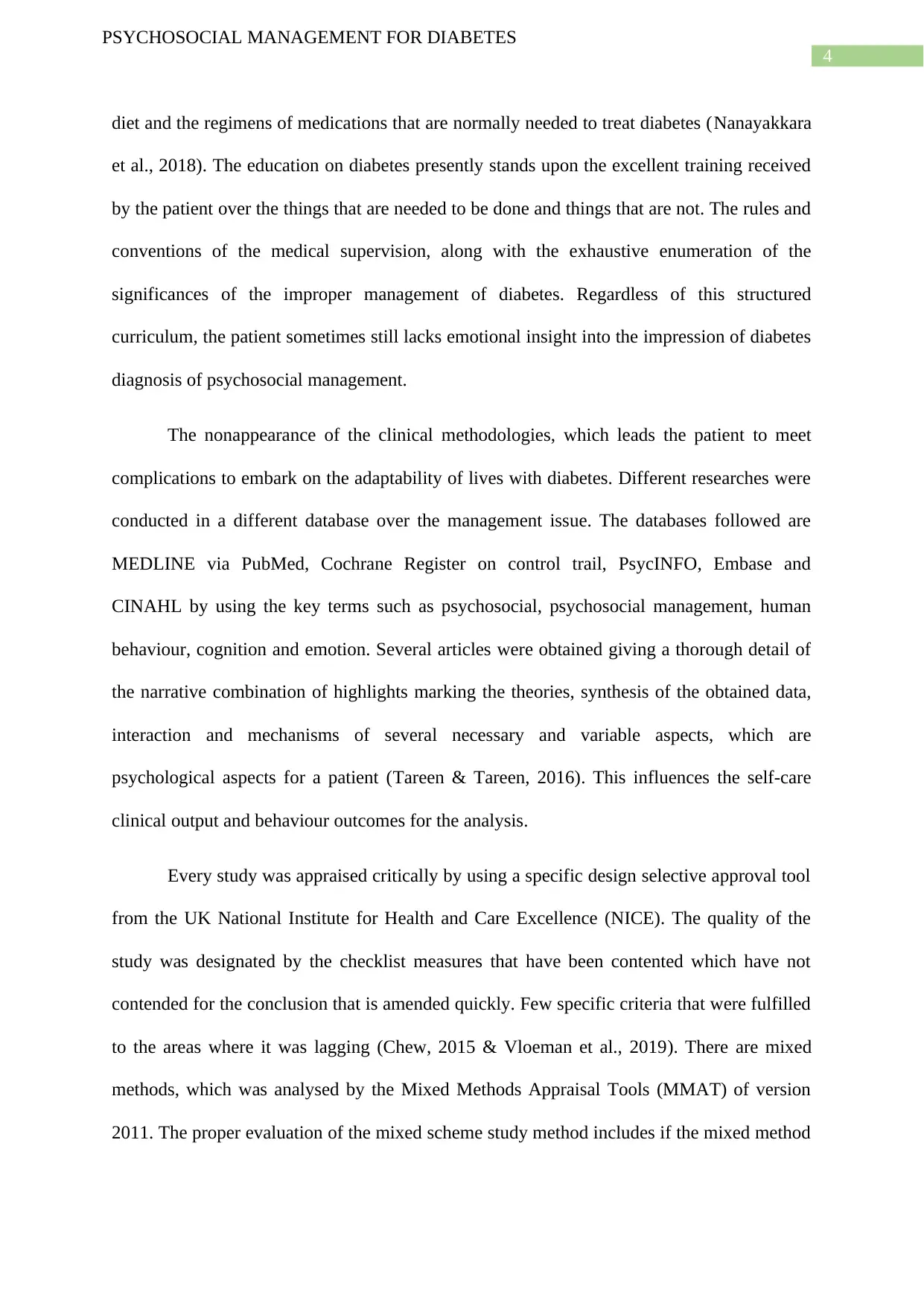
4
PSYCHOSOCIAL MANAGEMENT FOR DIABETES
diet and the regimens of medications that are normally needed to treat diabetes (Nanayakkara
et al., 2018). The education on diabetes presently stands upon the excellent training received
by the patient over the things that are needed to be done and things that are not. The rules and
conventions of the medical supervision, along with the exhaustive enumeration of the
significances of the improper management of diabetes. Regardless of this structured
curriculum, the patient sometimes still lacks emotional insight into the impression of diabetes
diagnosis of psychosocial management.
The nonappearance of the clinical methodologies, which leads the patient to meet
complications to embark on the adaptability of lives with diabetes. Different researches were
conducted in a different database over the management issue. The databases followed are
MEDLINE via PubMed, Cochrane Register on control trail, PsycINFO, Embase and
CINAHL by using the key terms such as psychosocial, psychosocial management, human
behaviour, cognition and emotion. Several articles were obtained giving a thorough detail of
the narrative combination of highlights marking the theories, synthesis of the obtained data,
interaction and mechanisms of several necessary and variable aspects, which are
psychological aspects for a patient (Tareen & Tareen, 2016). This influences the self-care
clinical output and behaviour outcomes for the analysis.
Every study was appraised critically by using a specific design selective approval tool
from the UK National Institute for Health and Care Excellence (NICE). The quality of the
study was designated by the checklist measures that have been contented which have not
contended for the conclusion that is amended quickly. Few specific criteria that were fulfilled
to the areas where it was lagging (Chew, 2015 & Vloeman et al., 2019). There are mixed
methods, which was analysed by the Mixed Methods Appraisal Tools (MMAT) of version
2011. The proper evaluation of the mixed scheme study method includes if the mixed method
PSYCHOSOCIAL MANAGEMENT FOR DIABETES
diet and the regimens of medications that are normally needed to treat diabetes (Nanayakkara
et al., 2018). The education on diabetes presently stands upon the excellent training received
by the patient over the things that are needed to be done and things that are not. The rules and
conventions of the medical supervision, along with the exhaustive enumeration of the
significances of the improper management of diabetes. Regardless of this structured
curriculum, the patient sometimes still lacks emotional insight into the impression of diabetes
diagnosis of psychosocial management.
The nonappearance of the clinical methodologies, which leads the patient to meet
complications to embark on the adaptability of lives with diabetes. Different researches were
conducted in a different database over the management issue. The databases followed are
MEDLINE via PubMed, Cochrane Register on control trail, PsycINFO, Embase and
CINAHL by using the key terms such as psychosocial, psychosocial management, human
behaviour, cognition and emotion. Several articles were obtained giving a thorough detail of
the narrative combination of highlights marking the theories, synthesis of the obtained data,
interaction and mechanisms of several necessary and variable aspects, which are
psychological aspects for a patient (Tareen & Tareen, 2016). This influences the self-care
clinical output and behaviour outcomes for the analysis.
Every study was appraised critically by using a specific design selective approval tool
from the UK National Institute for Health and Care Excellence (NICE). The quality of the
study was designated by the checklist measures that have been contented which have not
contended for the conclusion that is amended quickly. Few specific criteria that were fulfilled
to the areas where it was lagging (Chew, 2015 & Vloeman et al., 2019). There are mixed
methods, which was analysed by the Mixed Methods Appraisal Tools (MMAT) of version
2011. The proper evaluation of the mixed scheme study method includes if the mixed method
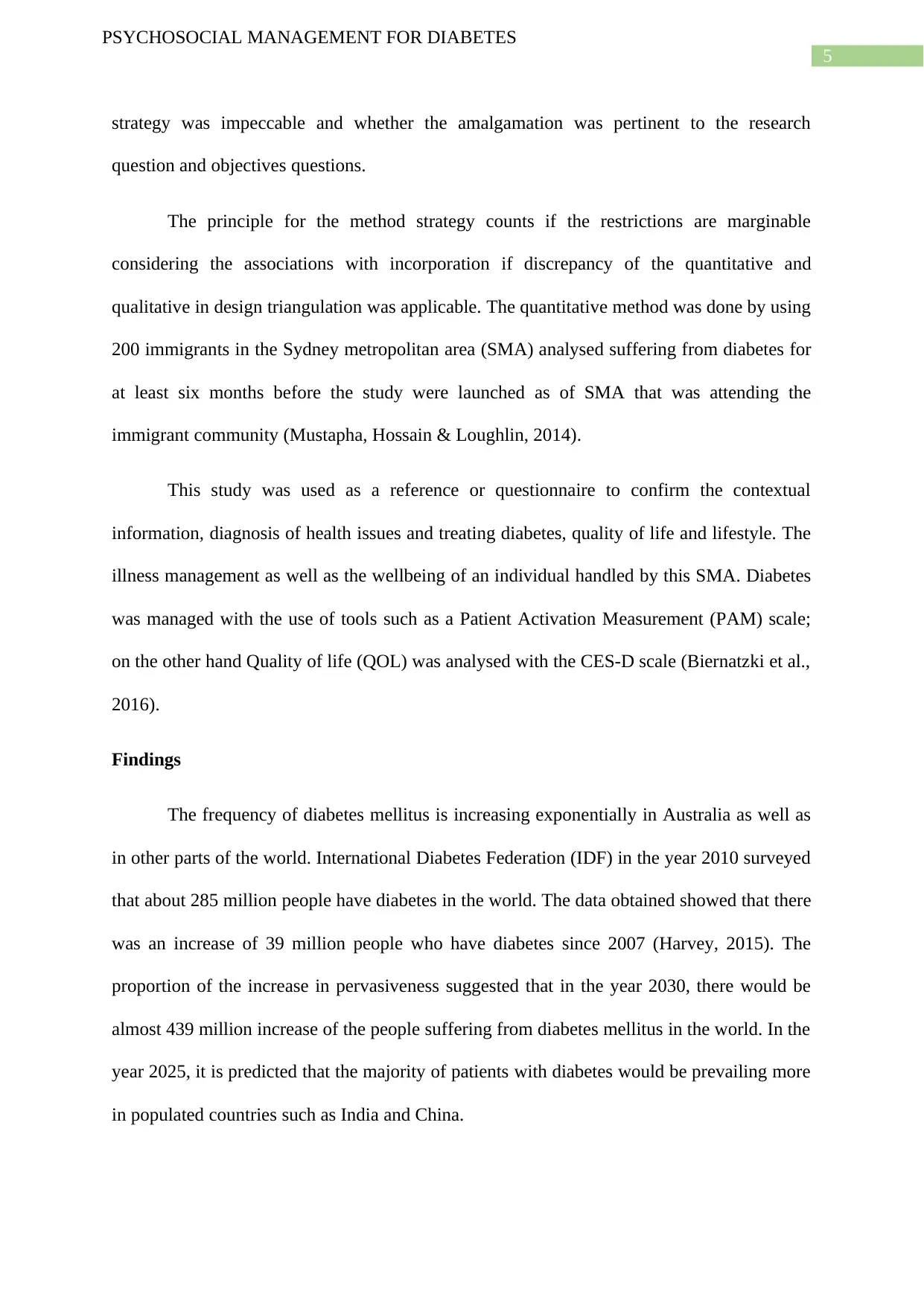
5
PSYCHOSOCIAL MANAGEMENT FOR DIABETES
strategy was impeccable and whether the amalgamation was pertinent to the research
question and objectives questions.
The principle for the method strategy counts if the restrictions are marginable
considering the associations with incorporation if discrepancy of the quantitative and
qualitative in design triangulation was applicable. The quantitative method was done by using
200 immigrants in the Sydney metropolitan area (SMA) analysed suffering from diabetes for
at least six months before the study were launched as of SMA that was attending the
immigrant community (Mustapha, Hossain & Loughlin, 2014).
This study was used as a reference or questionnaire to confirm the contextual
information, diagnosis of health issues and treating diabetes, quality of life and lifestyle. The
illness management as well as the wellbeing of an individual handled by this SMA. Diabetes
was managed with the use of tools such as a Patient Activation Measurement (PAM) scale;
on the other hand Quality of life (QOL) was analysed with the CES-D scale (Biernatzki et al.,
2016).
Findings
The frequency of diabetes mellitus is increasing exponentially in Australia as well as
in other parts of the world. International Diabetes Federation (IDF) in the year 2010 surveyed
that about 285 million people have diabetes in the world. The data obtained showed that there
was an increase of 39 million people who have diabetes since 2007 (Harvey, 2015). The
proportion of the increase in pervasiveness suggested that in the year 2030, there would be
almost 439 million increase of the people suffering from diabetes mellitus in the world. In the
year 2025, it is predicted that the majority of patients with diabetes would be prevailing more
in populated countries such as India and China.
PSYCHOSOCIAL MANAGEMENT FOR DIABETES
strategy was impeccable and whether the amalgamation was pertinent to the research
question and objectives questions.
The principle for the method strategy counts if the restrictions are marginable
considering the associations with incorporation if discrepancy of the quantitative and
qualitative in design triangulation was applicable. The quantitative method was done by using
200 immigrants in the Sydney metropolitan area (SMA) analysed suffering from diabetes for
at least six months before the study were launched as of SMA that was attending the
immigrant community (Mustapha, Hossain & Loughlin, 2014).
This study was used as a reference or questionnaire to confirm the contextual
information, diagnosis of health issues and treating diabetes, quality of life and lifestyle. The
illness management as well as the wellbeing of an individual handled by this SMA. Diabetes
was managed with the use of tools such as a Patient Activation Measurement (PAM) scale;
on the other hand Quality of life (QOL) was analysed with the CES-D scale (Biernatzki et al.,
2016).
Findings
The frequency of diabetes mellitus is increasing exponentially in Australia as well as
in other parts of the world. International Diabetes Federation (IDF) in the year 2010 surveyed
that about 285 million people have diabetes in the world. The data obtained showed that there
was an increase of 39 million people who have diabetes since 2007 (Harvey, 2015). The
proportion of the increase in pervasiveness suggested that in the year 2030, there would be
almost 439 million increase of the people suffering from diabetes mellitus in the world. In the
year 2025, it is predicted that the majority of patients with diabetes would be prevailing more
in populated countries such as India and China.
⊘ This is a preview!⊘
Do you want full access?
Subscribe today to unlock all pages.

Trusted by 1+ million students worldwide
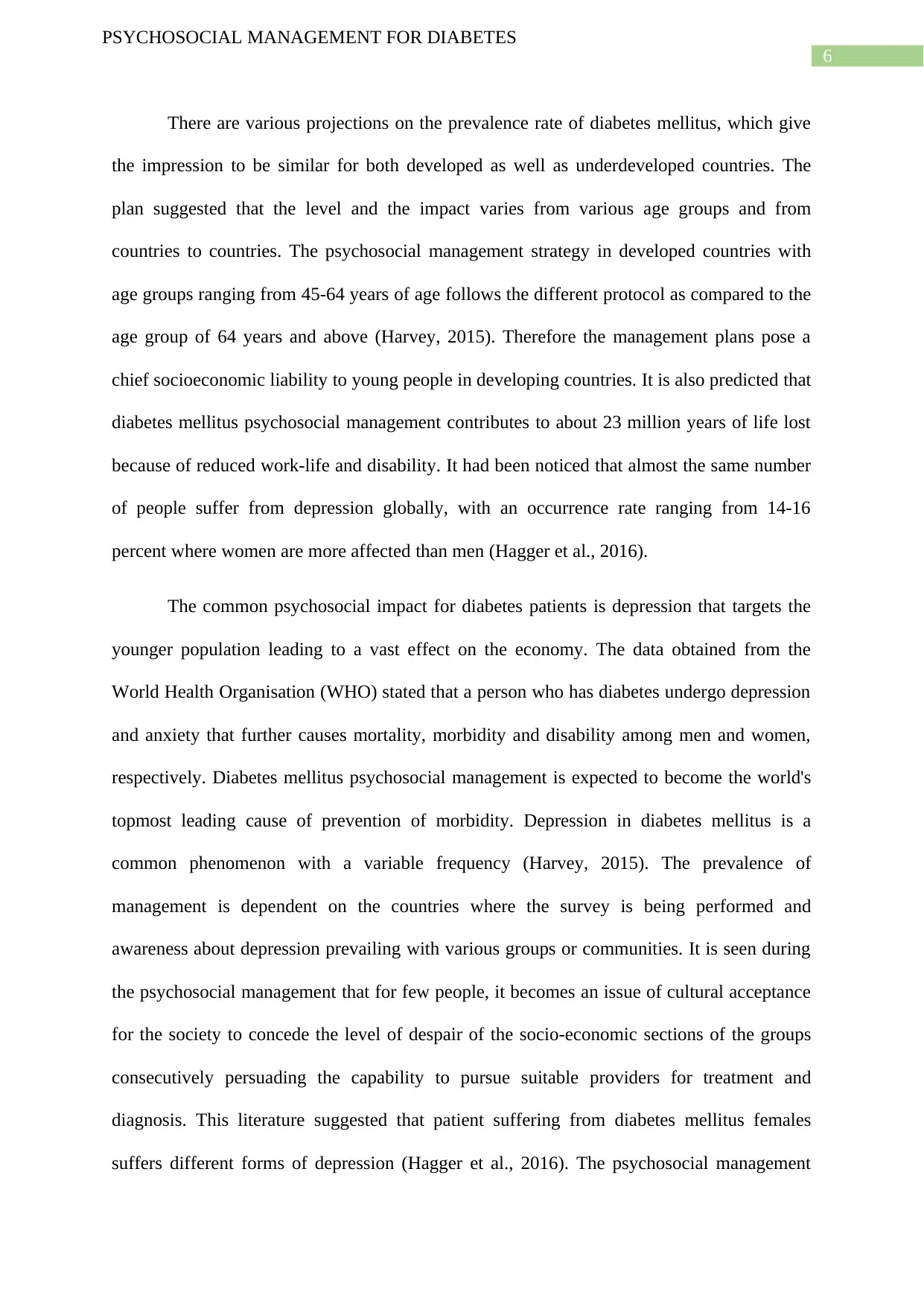
6
PSYCHOSOCIAL MANAGEMENT FOR DIABETES
There are various projections on the prevalence rate of diabetes mellitus, which give
the impression to be similar for both developed as well as underdeveloped countries. The
plan suggested that the level and the impact varies from various age groups and from
countries to countries. The psychosocial management strategy in developed countries with
age groups ranging from 45-64 years of age follows the different protocol as compared to the
age group of 64 years and above (Harvey, 2015). Therefore the management plans pose a
chief socioeconomic liability to young people in developing countries. It is also predicted that
diabetes mellitus psychosocial management contributes to about 23 million years of life lost
because of reduced work-life and disability. It had been noticed that almost the same number
of people suffer from depression globally, with an occurrence rate ranging from 14-16
percent where women are more affected than men (Hagger et al., 2016).
The common psychosocial impact for diabetes patients is depression that targets the
younger population leading to a vast effect on the economy. The data obtained from the
World Health Organisation (WHO) stated that a person who has diabetes undergo depression
and anxiety that further causes mortality, morbidity and disability among men and women,
respectively. Diabetes mellitus psychosocial management is expected to become the world's
topmost leading cause of prevention of morbidity. Depression in diabetes mellitus is a
common phenomenon with a variable frequency (Harvey, 2015). The prevalence of
management is dependent on the countries where the survey is being performed and
awareness about depression prevailing with various groups or communities. It is seen during
the psychosocial management that for few people, it becomes an issue of cultural acceptance
for the society to concede the level of despair of the socio-economic sections of the groups
consecutively persuading the capability to pursue suitable providers for treatment and
diagnosis. This literature suggested that patient suffering from diabetes mellitus females
suffers different forms of depression (Hagger et al., 2016). The psychosocial management
PSYCHOSOCIAL MANAGEMENT FOR DIABETES
There are various projections on the prevalence rate of diabetes mellitus, which give
the impression to be similar for both developed as well as underdeveloped countries. The
plan suggested that the level and the impact varies from various age groups and from
countries to countries. The psychosocial management strategy in developed countries with
age groups ranging from 45-64 years of age follows the different protocol as compared to the
age group of 64 years and above (Harvey, 2015). Therefore the management plans pose a
chief socioeconomic liability to young people in developing countries. It is also predicted that
diabetes mellitus psychosocial management contributes to about 23 million years of life lost
because of reduced work-life and disability. It had been noticed that almost the same number
of people suffer from depression globally, with an occurrence rate ranging from 14-16
percent where women are more affected than men (Hagger et al., 2016).
The common psychosocial impact for diabetes patients is depression that targets the
younger population leading to a vast effect on the economy. The data obtained from the
World Health Organisation (WHO) stated that a person who has diabetes undergo depression
and anxiety that further causes mortality, morbidity and disability among men and women,
respectively. Diabetes mellitus psychosocial management is expected to become the world's
topmost leading cause of prevention of morbidity. Depression in diabetes mellitus is a
common phenomenon with a variable frequency (Harvey, 2015). The prevalence of
management is dependent on the countries where the survey is being performed and
awareness about depression prevailing with various groups or communities. It is seen during
the psychosocial management that for few people, it becomes an issue of cultural acceptance
for the society to concede the level of despair of the socio-economic sections of the groups
consecutively persuading the capability to pursue suitable providers for treatment and
diagnosis. This literature suggested that patient suffering from diabetes mellitus females
suffers different forms of depression (Hagger et al., 2016). The psychosocial management
Paraphrase This Document
Need a fresh take? Get an instant paraphrase of this document with our AI Paraphraser
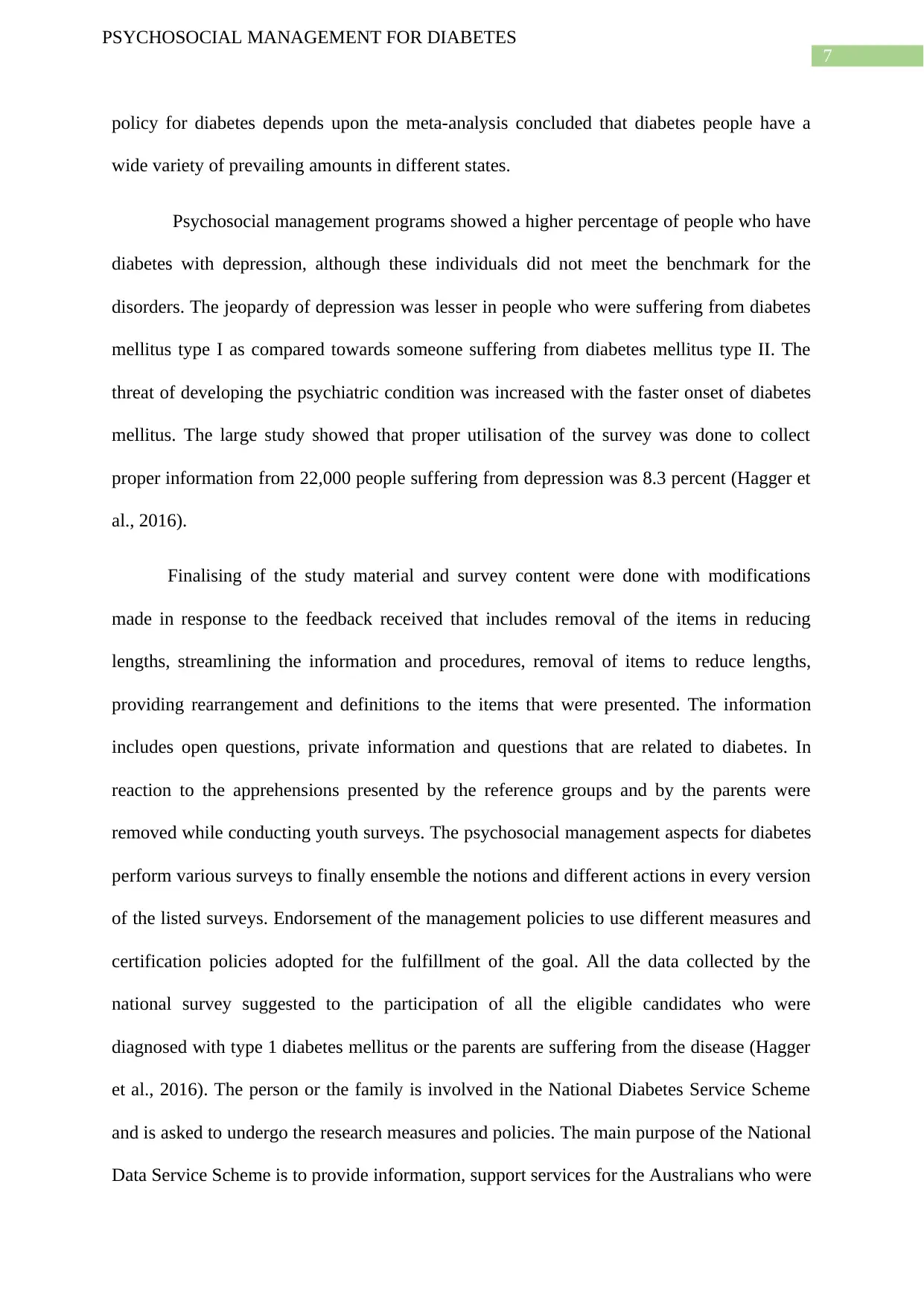
7
PSYCHOSOCIAL MANAGEMENT FOR DIABETES
policy for diabetes depends upon the meta-analysis concluded that diabetes people have a
wide variety of prevailing amounts in different states.
Psychosocial management programs showed a higher percentage of people who have
diabetes with depression, although these individuals did not meet the benchmark for the
disorders. The jeopardy of depression was lesser in people who were suffering from diabetes
mellitus type I as compared towards someone suffering from diabetes mellitus type II. The
threat of developing the psychiatric condition was increased with the faster onset of diabetes
mellitus. The large study showed that proper utilisation of the survey was done to collect
proper information from 22,000 people suffering from depression was 8.3 percent (Hagger et
al., 2016).
Finalising of the study material and survey content were done with modifications
made in response to the feedback received that includes removal of the items in reducing
lengths, streamlining the information and procedures, removal of items to reduce lengths,
providing rearrangement and definitions to the items that were presented. The information
includes open questions, private information and questions that are related to diabetes. In
reaction to the apprehensions presented by the reference groups and by the parents were
removed while conducting youth surveys. The psychosocial management aspects for diabetes
perform various surveys to finally ensemble the notions and different actions in every version
of the listed surveys. Endorsement of the management policies to use different measures and
certification policies adopted for the fulfillment of the goal. All the data collected by the
national survey suggested to the participation of all the eligible candidates who were
diagnosed with type 1 diabetes mellitus or the parents are suffering from the disease (Hagger
et al., 2016). The person or the family is involved in the National Diabetes Service Scheme
and is asked to undergo the research measures and policies. The main purpose of the National
Data Service Scheme is to provide information, support services for the Australians who were
PSYCHOSOCIAL MANAGEMENT FOR DIABETES
policy for diabetes depends upon the meta-analysis concluded that diabetes people have a
wide variety of prevailing amounts in different states.
Psychosocial management programs showed a higher percentage of people who have
diabetes with depression, although these individuals did not meet the benchmark for the
disorders. The jeopardy of depression was lesser in people who were suffering from diabetes
mellitus type I as compared towards someone suffering from diabetes mellitus type II. The
threat of developing the psychiatric condition was increased with the faster onset of diabetes
mellitus. The large study showed that proper utilisation of the survey was done to collect
proper information from 22,000 people suffering from depression was 8.3 percent (Hagger et
al., 2016).
Finalising of the study material and survey content were done with modifications
made in response to the feedback received that includes removal of the items in reducing
lengths, streamlining the information and procedures, removal of items to reduce lengths,
providing rearrangement and definitions to the items that were presented. The information
includes open questions, private information and questions that are related to diabetes. In
reaction to the apprehensions presented by the reference groups and by the parents were
removed while conducting youth surveys. The psychosocial management aspects for diabetes
perform various surveys to finally ensemble the notions and different actions in every version
of the listed surveys. Endorsement of the management policies to use different measures and
certification policies adopted for the fulfillment of the goal. All the data collected by the
national survey suggested to the participation of all the eligible candidates who were
diagnosed with type 1 diabetes mellitus or the parents are suffering from the disease (Hagger
et al., 2016). The person or the family is involved in the National Diabetes Service Scheme
and is asked to undergo the research measures and policies. The main purpose of the National
Data Service Scheme is to provide information, support services for the Australians who were
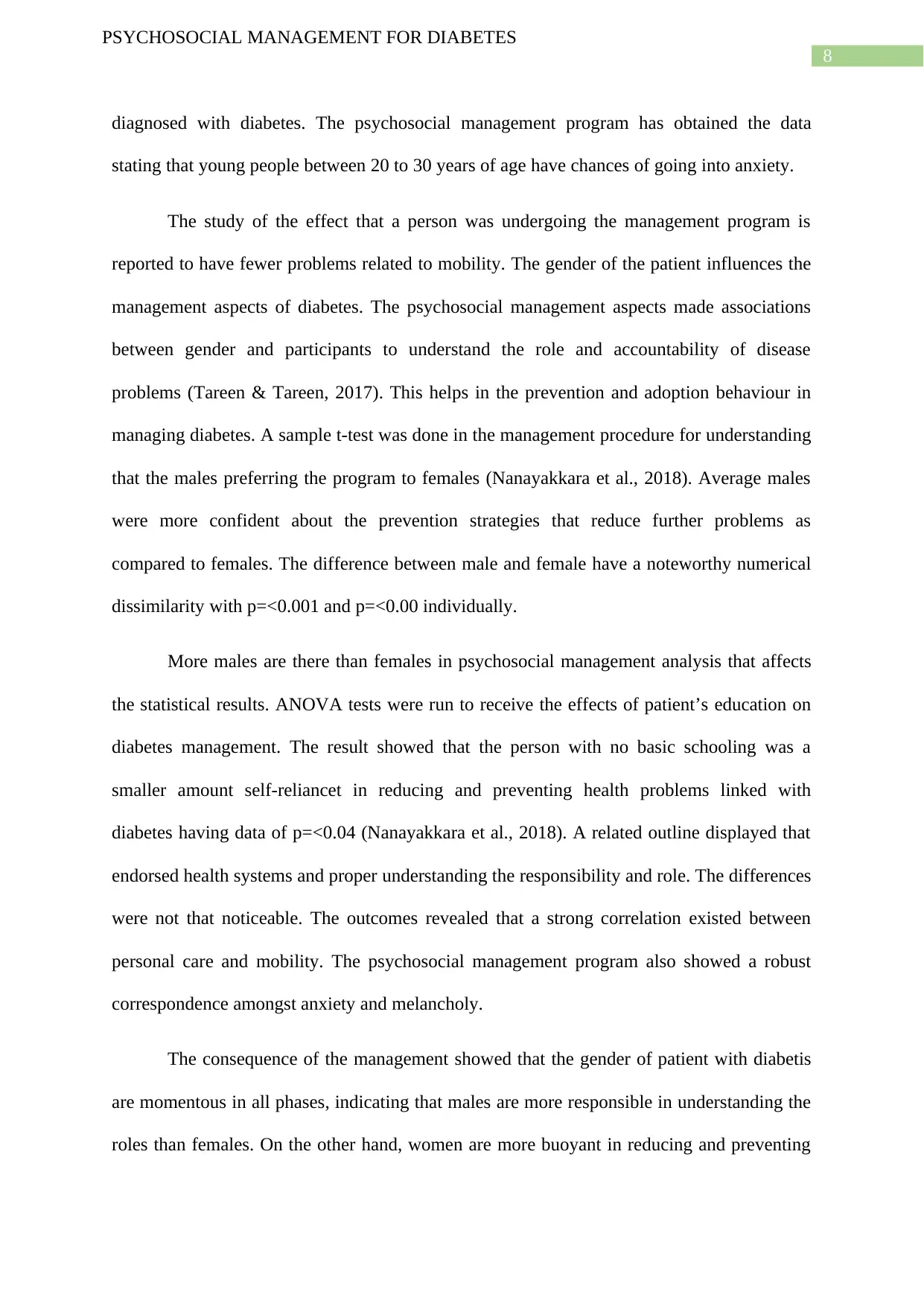
8
PSYCHOSOCIAL MANAGEMENT FOR DIABETES
diagnosed with diabetes. The psychosocial management program has obtained the data
stating that young people between 20 to 30 years of age have chances of going into anxiety.
The study of the effect that a person was undergoing the management program is
reported to have fewer problems related to mobility. The gender of the patient influences the
management aspects of diabetes. The psychosocial management aspects made associations
between gender and participants to understand the role and accountability of disease
problems (Tareen & Tareen, 2017). This helps in the prevention and adoption behaviour in
managing diabetes. A sample t-test was done in the management procedure for understanding
that the males preferring the program to females (Nanayakkara et al., 2018). Average males
were more confident about the prevention strategies that reduce further problems as
compared to females. The difference between male and female have a noteworthy numerical
dissimilarity with p=<0.001 and p=<0.00 individually.
More males are there than females in psychosocial management analysis that affects
the statistical results. ANOVA tests were run to receive the effects of patient’s education on
diabetes management. The result showed that the person with no basic schooling was a
smaller amount self-reliancet in reducing and preventing health problems linked with
diabetes having data of p=<0.04 (Nanayakkara et al., 2018). A related outline displayed that
endorsed health systems and proper understanding the responsibility and role. The differences
were not that noticeable. The outcomes revealed that a strong correlation existed between
personal care and mobility. The psychosocial management program also showed a robust
correspondence amongst anxiety and melancholy.
The consequence of the management showed that the gender of patient with diabetis
are momentous in all phases, indicating that males are more responsible in understanding the
roles than females. On the other hand, women are more buoyant in reducing and preventing
PSYCHOSOCIAL MANAGEMENT FOR DIABETES
diagnosed with diabetes. The psychosocial management program has obtained the data
stating that young people between 20 to 30 years of age have chances of going into anxiety.
The study of the effect that a person was undergoing the management program is
reported to have fewer problems related to mobility. The gender of the patient influences the
management aspects of diabetes. The psychosocial management aspects made associations
between gender and participants to understand the role and accountability of disease
problems (Tareen & Tareen, 2017). This helps in the prevention and adoption behaviour in
managing diabetes. A sample t-test was done in the management procedure for understanding
that the males preferring the program to females (Nanayakkara et al., 2018). Average males
were more confident about the prevention strategies that reduce further problems as
compared to females. The difference between male and female have a noteworthy numerical
dissimilarity with p=<0.001 and p=<0.00 individually.
More males are there than females in psychosocial management analysis that affects
the statistical results. ANOVA tests were run to receive the effects of patient’s education on
diabetes management. The result showed that the person with no basic schooling was a
smaller amount self-reliancet in reducing and preventing health problems linked with
diabetes having data of p=<0.04 (Nanayakkara et al., 2018). A related outline displayed that
endorsed health systems and proper understanding the responsibility and role. The differences
were not that noticeable. The outcomes revealed that a strong correlation existed between
personal care and mobility. The psychosocial management program also showed a robust
correspondence amongst anxiety and melancholy.
The consequence of the management showed that the gender of patient with diabetis
are momentous in all phases, indicating that males are more responsible in understanding the
roles than females. On the other hand, women are more buoyant in reducing and preventing
⊘ This is a preview!⊘
Do you want full access?
Subscribe today to unlock all pages.

Trusted by 1+ million students worldwide
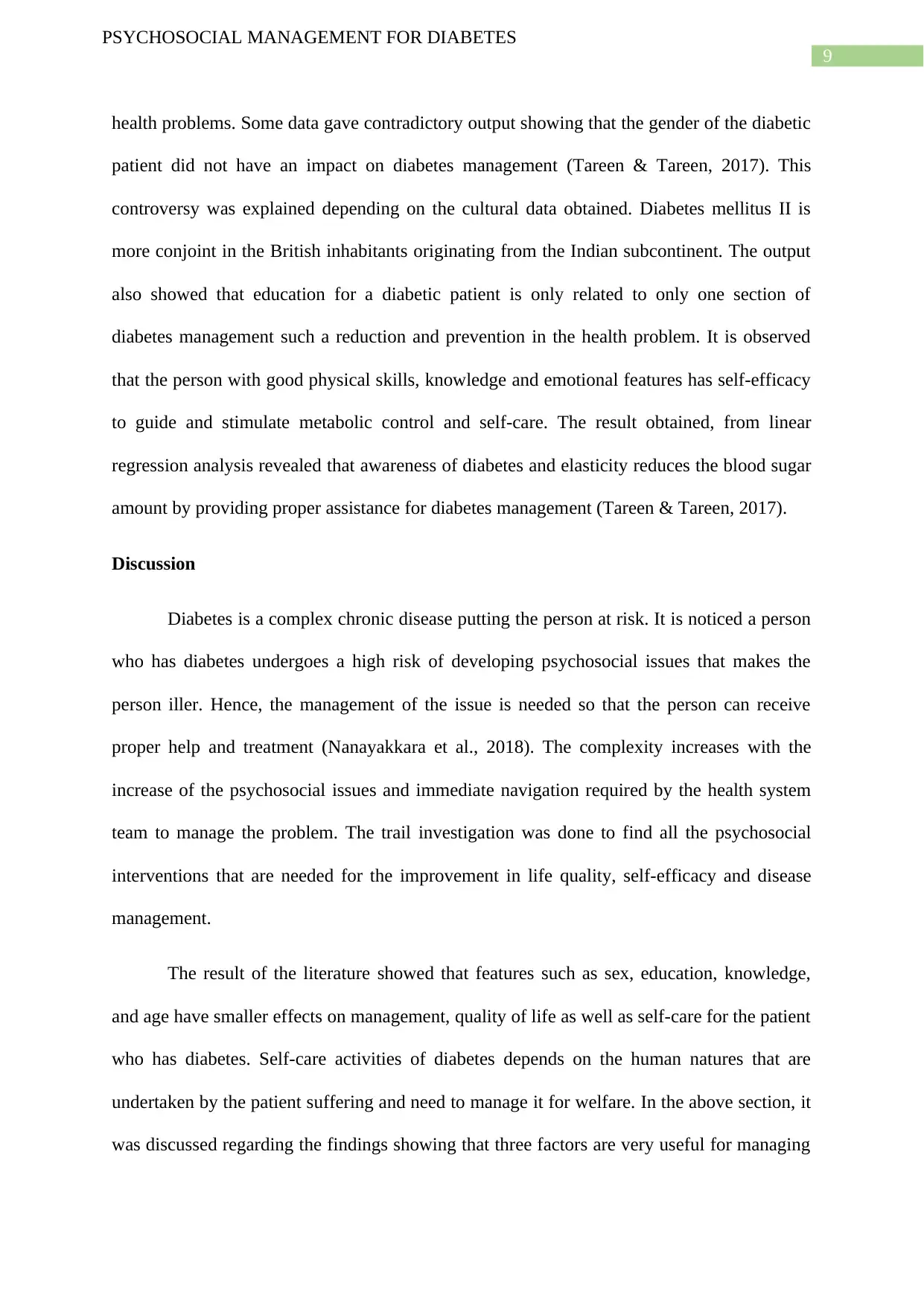
9
PSYCHOSOCIAL MANAGEMENT FOR DIABETES
health problems. Some data gave contradictory output showing that the gender of the diabetic
patient did not have an impact on diabetes management (Tareen & Tareen, 2017). This
controversy was explained depending on the cultural data obtained. Diabetes mellitus II is
more conjoint in the British inhabitants originating from the Indian subcontinent. The output
also showed that education for a diabetic patient is only related to only one section of
diabetes management such a reduction and prevention in the health problem. It is observed
that the person with good physical skills, knowledge and emotional features has self-efficacy
to guide and stimulate metabolic control and self-care. The result obtained, from linear
regression analysis revealed that awareness of diabetes and elasticity reduces the blood sugar
amount by providing proper assistance for diabetes management (Tareen & Tareen, 2017).
Discussion
Diabetes is a complex chronic disease putting the person at risk. It is noticed a person
who has diabetes undergoes a high risk of developing psychosocial issues that makes the
person iller. Hence, the management of the issue is needed so that the person can receive
proper help and treatment (Nanayakkara et al., 2018). The complexity increases with the
increase of the psychosocial issues and immediate navigation required by the health system
team to manage the problem. The trail investigation was done to find all the psychosocial
interventions that are needed for the improvement in life quality, self-efficacy and disease
management.
The result of the literature showed that features such as sex, education, knowledge,
and age have smaller effects on management, quality of life as well as self-care for the patient
who has diabetes. Self-care activities of diabetes depends on the human natures that are
undertaken by the patient suffering and need to manage it for welfare. In the above section, it
was discussed regarding the findings showing that three factors are very useful for managing
PSYCHOSOCIAL MANAGEMENT FOR DIABETES
health problems. Some data gave contradictory output showing that the gender of the diabetic
patient did not have an impact on diabetes management (Tareen & Tareen, 2017). This
controversy was explained depending on the cultural data obtained. Diabetes mellitus II is
more conjoint in the British inhabitants originating from the Indian subcontinent. The output
also showed that education for a diabetic patient is only related to only one section of
diabetes management such a reduction and prevention in the health problem. It is observed
that the person with good physical skills, knowledge and emotional features has self-efficacy
to guide and stimulate metabolic control and self-care. The result obtained, from linear
regression analysis revealed that awareness of diabetes and elasticity reduces the blood sugar
amount by providing proper assistance for diabetes management (Tareen & Tareen, 2017).
Discussion
Diabetes is a complex chronic disease putting the person at risk. It is noticed a person
who has diabetes undergoes a high risk of developing psychosocial issues that makes the
person iller. Hence, the management of the issue is needed so that the person can receive
proper help and treatment (Nanayakkara et al., 2018). The complexity increases with the
increase of the psychosocial issues and immediate navigation required by the health system
team to manage the problem. The trail investigation was done to find all the psychosocial
interventions that are needed for the improvement in life quality, self-efficacy and disease
management.
The result of the literature showed that features such as sex, education, knowledge,
and age have smaller effects on management, quality of life as well as self-care for the patient
who has diabetes. Self-care activities of diabetes depends on the human natures that are
undertaken by the patient suffering and need to manage it for welfare. In the above section, it
was discussed regarding the findings showing that three factors are very useful for managing
Paraphrase This Document
Need a fresh take? Get an instant paraphrase of this document with our AI Paraphraser
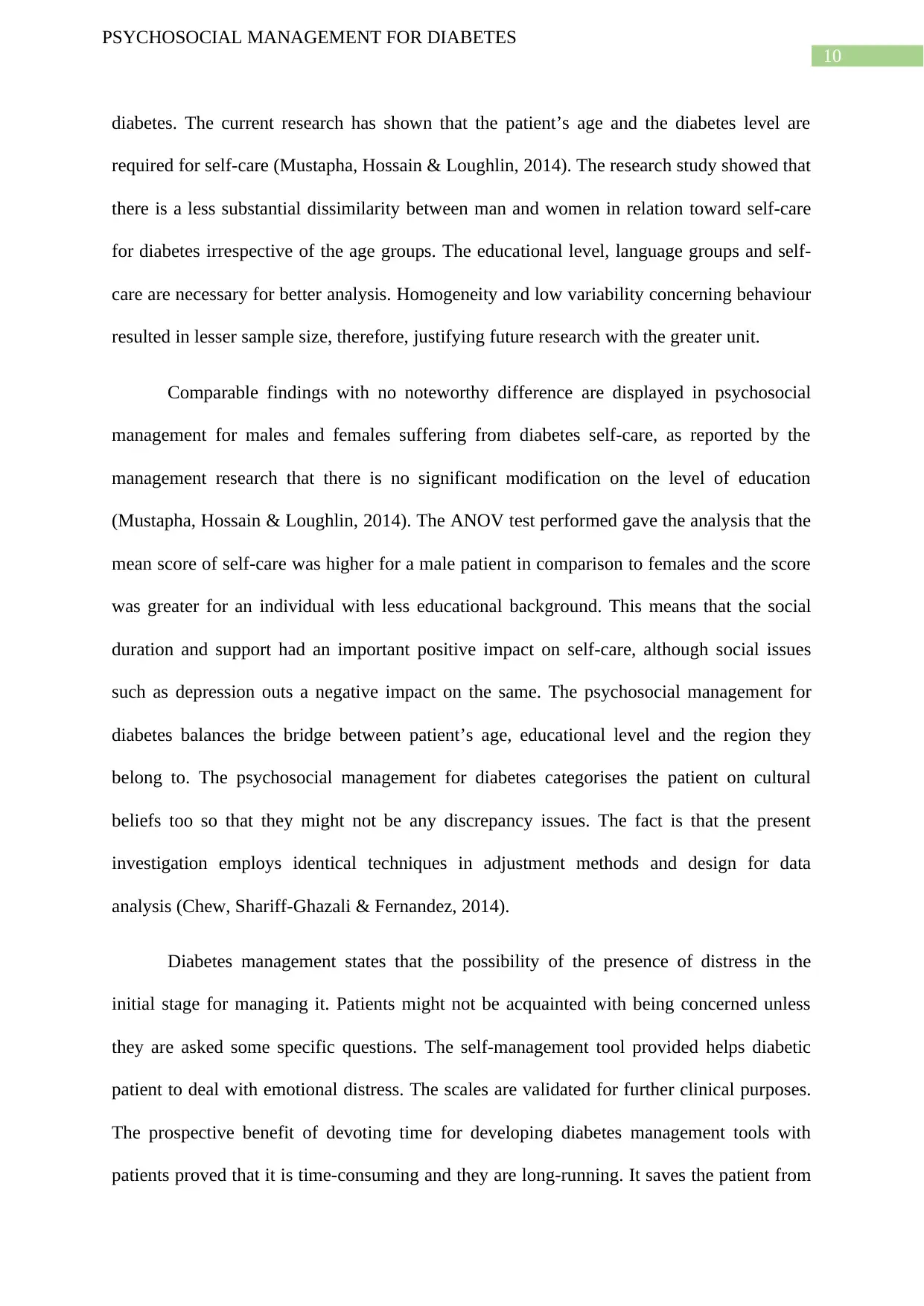
10
PSYCHOSOCIAL MANAGEMENT FOR DIABETES
diabetes. The current research has shown that the patient’s age and the diabetes level are
required for self-care (Mustapha, Hossain & Loughlin, 2014). The research study showed that
there is a less substantial dissimilarity between man and women in relation toward self-care
for diabetes irrespective of the age groups. The educational level, language groups and self-
care are necessary for better analysis. Homogeneity and low variability concerning behaviour
resulted in lesser sample size, therefore, justifying future research with the greater unit.
Comparable findings with no noteworthy difference are displayed in psychosocial
management for males and females suffering from diabetes self-care, as reported by the
management research that there is no significant modification on the level of education
(Mustapha, Hossain & Loughlin, 2014). The ANOV test performed gave the analysis that the
mean score of self-care was higher for a male patient in comparison to females and the score
was greater for an individual with less educational background. This means that the social
duration and support had an important positive impact on self-care, although social issues
such as depression outs a negative impact on the same. The psychosocial management for
diabetes balances the bridge between patient’s age, educational level and the region they
belong to. The psychosocial management for diabetes categorises the patient on cultural
beliefs too so that they might not be any discrepancy issues. The fact is that the present
investigation employs identical techniques in adjustment methods and design for data
analysis (Chew, Shariff-Ghazali & Fernandez, 2014).
Diabetes management states that the possibility of the presence of distress in the
initial stage for managing it. Patients might not be acquainted with being concerned unless
they are asked some specific questions. The self-management tool provided helps diabetic
patient to deal with emotional distress. The scales are validated for further clinical purposes.
The prospective benefit of devoting time for developing diabetes management tools with
patients proved that it is time-consuming and they are long-running. It saves the patient from
PSYCHOSOCIAL MANAGEMENT FOR DIABETES
diabetes. The current research has shown that the patient’s age and the diabetes level are
required for self-care (Mustapha, Hossain & Loughlin, 2014). The research study showed that
there is a less substantial dissimilarity between man and women in relation toward self-care
for diabetes irrespective of the age groups. The educational level, language groups and self-
care are necessary for better analysis. Homogeneity and low variability concerning behaviour
resulted in lesser sample size, therefore, justifying future research with the greater unit.
Comparable findings with no noteworthy difference are displayed in psychosocial
management for males and females suffering from diabetes self-care, as reported by the
management research that there is no significant modification on the level of education
(Mustapha, Hossain & Loughlin, 2014). The ANOV test performed gave the analysis that the
mean score of self-care was higher for a male patient in comparison to females and the score
was greater for an individual with less educational background. This means that the social
duration and support had an important positive impact on self-care, although social issues
such as depression outs a negative impact on the same. The psychosocial management for
diabetes balances the bridge between patient’s age, educational level and the region they
belong to. The psychosocial management for diabetes categorises the patient on cultural
beliefs too so that they might not be any discrepancy issues. The fact is that the present
investigation employs identical techniques in adjustment methods and design for data
analysis (Chew, Shariff-Ghazali & Fernandez, 2014).
Diabetes management states that the possibility of the presence of distress in the
initial stage for managing it. Patients might not be acquainted with being concerned unless
they are asked some specific questions. The self-management tool provided helps diabetic
patient to deal with emotional distress. The scales are validated for further clinical purposes.
The prospective benefit of devoting time for developing diabetes management tools with
patients proved that it is time-consuming and they are long-running. It saves the patient from
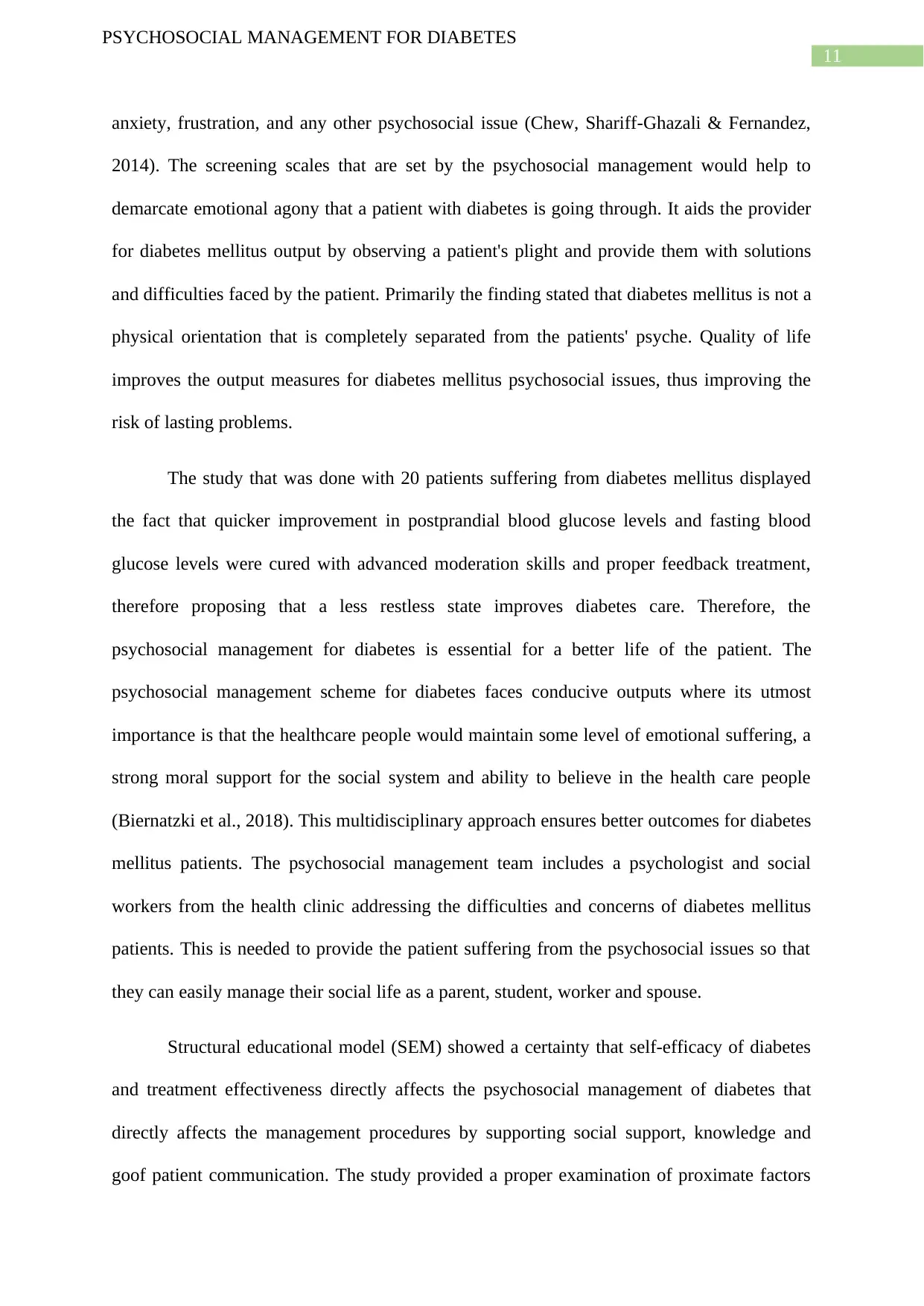
11
PSYCHOSOCIAL MANAGEMENT FOR DIABETES
anxiety, frustration, and any other psychosocial issue (Chew, Shariff-Ghazali & Fernandez,
2014). The screening scales that are set by the psychosocial management would help to
demarcate emotional agony that a patient with diabetes is going through. It aids the provider
for diabetes mellitus output by observing a patient's plight and provide them with solutions
and difficulties faced by the patient. Primarily the finding stated that diabetes mellitus is not a
physical orientation that is completely separated from the patients' psyche. Quality of life
improves the output measures for diabetes mellitus psychosocial issues, thus improving the
risk of lasting problems.
The study that was done with 20 patients suffering from diabetes mellitus displayed
the fact that quicker improvement in postprandial blood glucose levels and fasting blood
glucose levels were cured with advanced moderation skills and proper feedback treatment,
therefore proposing that a less restless state improves diabetes care. Therefore, the
psychosocial management for diabetes is essential for a better life of the patient. The
psychosocial management scheme for diabetes faces conducive outputs where its utmost
importance is that the healthcare people would maintain some level of emotional suffering, a
strong moral support for the social system and ability to believe in the health care people
(Biernatzki et al., 2018). This multidisciplinary approach ensures better outcomes for diabetes
mellitus patients. The psychosocial management team includes a psychologist and social
workers from the health clinic addressing the difficulties and concerns of diabetes mellitus
patients. This is needed to provide the patient suffering from the psychosocial issues so that
they can easily manage their social life as a parent, student, worker and spouse.
Structural educational model (SEM) showed a certainty that self-efficacy of diabetes
and treatment effectiveness directly affects the psychosocial management of diabetes that
directly affects the management procedures by supporting social support, knowledge and
goof patient communication. The study provided a proper examination of proximate factors
PSYCHOSOCIAL MANAGEMENT FOR DIABETES
anxiety, frustration, and any other psychosocial issue (Chew, Shariff-Ghazali & Fernandez,
2014). The screening scales that are set by the psychosocial management would help to
demarcate emotional agony that a patient with diabetes is going through. It aids the provider
for diabetes mellitus output by observing a patient's plight and provide them with solutions
and difficulties faced by the patient. Primarily the finding stated that diabetes mellitus is not a
physical orientation that is completely separated from the patients' psyche. Quality of life
improves the output measures for diabetes mellitus psychosocial issues, thus improving the
risk of lasting problems.
The study that was done with 20 patients suffering from diabetes mellitus displayed
the fact that quicker improvement in postprandial blood glucose levels and fasting blood
glucose levels were cured with advanced moderation skills and proper feedback treatment,
therefore proposing that a less restless state improves diabetes care. Therefore, the
psychosocial management for diabetes is essential for a better life of the patient. The
psychosocial management scheme for diabetes faces conducive outputs where its utmost
importance is that the healthcare people would maintain some level of emotional suffering, a
strong moral support for the social system and ability to believe in the health care people
(Biernatzki et al., 2018). This multidisciplinary approach ensures better outcomes for diabetes
mellitus patients. The psychosocial management team includes a psychologist and social
workers from the health clinic addressing the difficulties and concerns of diabetes mellitus
patients. This is needed to provide the patient suffering from the psychosocial issues so that
they can easily manage their social life as a parent, student, worker and spouse.
Structural educational model (SEM) showed a certainty that self-efficacy of diabetes
and treatment effectiveness directly affects the psychosocial management of diabetes that
directly affects the management procedures by supporting social support, knowledge and
goof patient communication. The study provided a proper examination of proximate factors
⊘ This is a preview!⊘
Do you want full access?
Subscribe today to unlock all pages.

Trusted by 1+ million students worldwide
1 out of 23
Related Documents
Your All-in-One AI-Powered Toolkit for Academic Success.
+13062052269
info@desklib.com
Available 24*7 on WhatsApp / Email
![[object Object]](/_next/static/media/star-bottom.7253800d.svg)
Unlock your academic potential
Copyright © 2020–2026 A2Z Services. All Rights Reserved. Developed and managed by ZUCOL.





